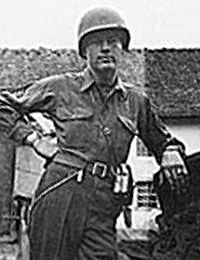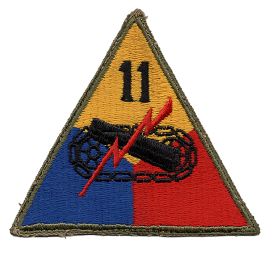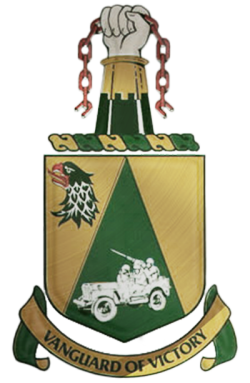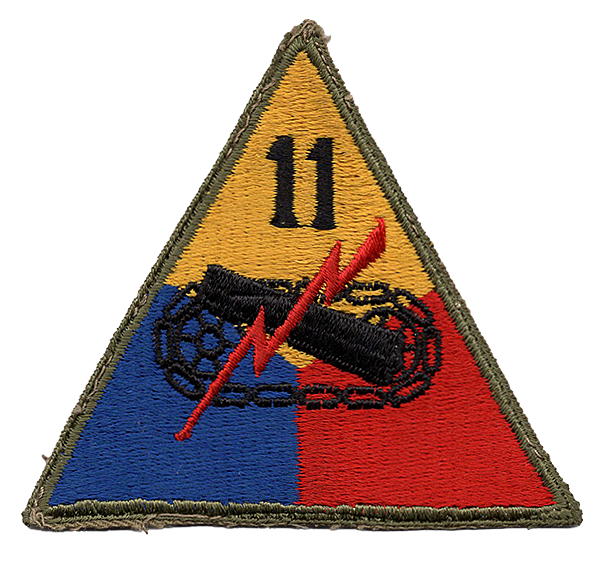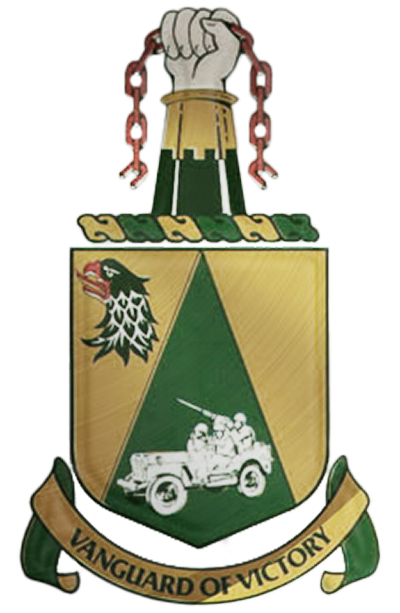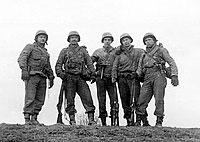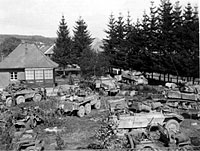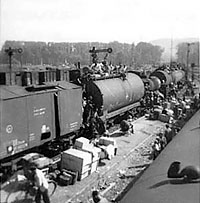I've been putting off telling you something for a long time Mother, and I guess this is time I told you. I heard some bad news when I returned to the Division. I was in this this town of Wendelsheim back across the Rhine where our rear eschelon was situated at the time, and the morning they were pulling out I ran across a fellow named Allen that I used to know quite well in A.S.T.P. [army specialized training program] He is in the 56th Engineers now, same Co. as Bakewell, and therefore I asked if would say Hello to Bakewell for me. He looked at me and said, 'Bakewell! He's dead'. Well, that's the way I got it, only a little more sudden. Allen didn't know any of the particulars, and I haven't seen anyone else from there to find out anything [more]. I think he must have gotten it in the first part of January in the latter part of the Battle of the Bulge.It surely is a shame. I still think that it [was] best that he did get married, though maybe I'm wrong. I'll bet that she's not sorry though.
As for Chuck, I can't find out anything definite. I know that he was evacuated; one said frozen feet, another said he had bad wounds and was back in the States. I'll try to find out more. The Battle of the Bulge must have been Cruel, bitter fighting, nothing like this last phase of the final drive.I guess you know that the 11th [Armored Division] got there in the nick of time. I won't say that they stopped the Krauts, because from what I heard from the fellows, the 6th Armd. took the beating there. Nonetheless, the 11th played an important part,and they were very unfortunate to be in a counter offensive such as that one was. Both sides lost heavily and I guess it ranks with some of the worst fighting of the War, at least in the E.T.O. [European theater of operations].
By the time I got to the fight, it was practically over as far as the big picture was concerned. The Armd. Division could move as fast as the tracks would carry them, except for the fact that their supply lines were so vulnerable to small arms fire. For that reason we slowed down and only moved as fast as the Infantry could clear the woods behind us. For a period of time there, we were losing a great many gasoline trucks due to snipers passed up. Finally they started convoying the supply trains with tanks, which helped, along with the fact that we slowed down.
Around Suhl is where we were having some of this trouble. Sometimes the terrain would be such that heavy, dense woods were all around us, and the road would be hardly wide enough for the light tanks to get through. In these places, a handful of Infantry could play hell with our armored column. That was the[ir] plan, but human nature proved stronger than Hitler's influence, especially when he [Hitler] was safe underground and these old men were [exposed] to elements of nature and the overwhelming odds of our Panzers.
Their main weapon, if they had used it to any extent, would have been the Panzerfaust. One of these fired at close range will knock out a medium tank. Of course, the one who fires the thing faces certain death. That was the big drawback to the weapon. Even the most fanatical Nazi hated to trade his life for one American tank, because he knew that there were hundreds behind that one. No, the only ones who used those Panzerfausts were the Hitler Youth in the Wehrmacht, kids of 15 & 16. They just didn't know what the score was. Even that small percentage was enough to keep you on the alert and wonder[ing] if one was in the woods to either side, because there millions of acres of those pine woods in Germany.
We also came across a lot of road blocks, but they never stopped us, just slowed us up. Snipers in towns caused the Infantry trouble, but we were only troubled like that once. I only experienced 2 artillery barrages and the column was fired on 3 times by Panzerfausts while I was with them. I've seen countless Krauts holding those things, but they were "resting". Don't think what you're thinking, because comparatively speaking, I didn't see any gruesome sights. I guess that there were plenty in the Bulge.
"Hoping to hear from you soon, I'll close and send Love and Kisses, Jerry"
An excerpt from a letter home from Spc. Jerry Bartling, Sunday June 2, '45, Linz, Austria
"...One shell tore my bed roll all up and put nicks all over the tank, but we on the inside only got a shower of dirt and a feeling that is another one of those unexplainable [things]. It's usually called Fear, but I think that that word doesn't explain it very well. Fear comes close enough though, I guess.
That fellow might be here today if we had moved a little sooner, but you never know. If out tank driver had driven just 8 ft. further across that open field, that one shell would have dropped right in [our] open top and alles would have been kaput.
One other time they started bracketing [us] with that indirect artillery fire which is of the "to whom it may concern" variety, and we just sat there in the open. Finally, we moved our tank to cover while the troop we were attached to left their armored cars and peeps, and took off for nearby cover. As a result, several vehicles were lost and others damaged. I'm afraid I'll have to blame some of the officers for some of these incidents. Of course, we always tend to find fault with officers and magnify their mistakes when we probably couldn't do any better ourselves.
I do remember one blunder which was almost inexcusable in the eyes of our E.M. and the attached T.D's (tank destroyers). It happened about 10 miles south of Suhl at a town called Slushigen or something like that. Anyway, it was a fairly large town, about 40,000 or more. We were making a drive with a small task force, which consisted of a Recon troop, a platoon of light tanks, a T.D. platoon and our assault gun platoon. All told, about 200 men or more.
We hadn't encountered much that day, and I suppose that that prompted them to try to take this town. Anyway, we pulled in to the edge of it about 8:30 PM after bypassing a series of roadblocks. If we had to get out of there in the middle of the night it would be risky business. Narrow trails, sharp turns, small streams and mud holes. Nicht gute. We took over a house on the edge of the town and there wasn't time to search the town, or even the nearby houses.
For security, this bright Major set up outposts on the other three edges of the town.
An outpost consists of a platoon or less, usually less. I had first guard duty and before dark, I heard a burp gun about 3 or 4 hundred yards away. Right then I began to get a hunch. Inside the house, our platoon leader found some good cognac, vermouth and wine. All in all, a good stock of liqour and, as usual, he started right into it and was beginning to get really tight. Our platoon Sgt, realizing the gravity of the situation, tried to get him to take it easy, but I guess the platoon leader thought the stuff wouldn't keep and [he] has an enormous capacity for the stuff. I went to bed,or at least I laid down on the floor. No one had to tell me to keep my shoes on.
Well, the expected happened about 11:00. We were rudely awakened and told we were moving out. I got out on the porch and it seemed as if all hell had broken loose. There were several fires and plenty of shooting. I couldn't get out of there fast enough. I still don't know how we all got out, but not a man was lost. Our platoon leader didn't know what was going on, of course. Incidently, the Major went back to Hqs for the night. He left before dark. I think every vehicle got stuck at least once that night retreating out of there. If your tank gets stuck in a situation like that, it's just too bad, because the column doesn't stop. You just have to depend on a friend giving you a hand. And [as for] the guys manning the outposts, well, it's just too bad for them, too. They figure that it's better to lose a vehicle or two than for everyone to get it.
One platoon stuck it out there all night, maintaining contact with the enemy. That calls for guts. I don't believe any of those boys or their Lt. got a Silver Star for bravery, although the Major did get one on another mission. Things were rather disorganized the rest of the night and we were plenty mad. No one knew at the time what had happened to the outposts. We expected a good many casualties, though, and we really expected the Germans to use the T.D's against us.
However, the guys came straggling in the next morning on foot and were fairly certain all of their vehicles had been destroyed. They had been attacked by small bands of infantry, and everyone had to take off on their own. You can't fight infantry in close quarters at night with only T.D's and a handful of men. The T.D's were lost plus the vehicles of a Recon platoon, but no lives were lost, and that was the thing that relieved all of us.
The next day, an entire Combat Command took over the town. That's roughly a Battalion of infantry, Bn tanks, field artillery, with all attachments, engineers, signal, etc. and us. We helped mop up the outskirts. We fired our .50s at bushes and such, and now and then a German soldier would tumble out. I did quite a bit of firing that day, also. We'd shoot in a few rounds of HE (high explosive shell) and a few Germans would come out. Then, we would have to do the same thing again and again. After we had been firing several hours, they gave up once they saw that we would take them prisoner.
Well, I think I'll close now.
Lots of love, Jerry
